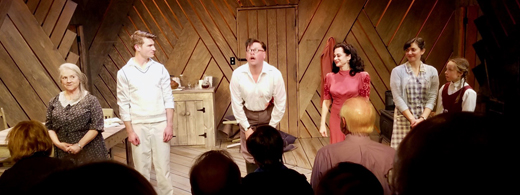
By Cantor Sheldon Foster Merel

SOLANA BEACH, California — Last December I reviewed the movie Guernsey Literary Potato Peel Society on this website. It took place on England’s Guernsey and Channel islands just off the coast of France during World War II . I learned then that Winston Churchill considered these islands indefensible and removed all its armaments to avoid bombing by the Germans and loss of resident lives.
The islands were occupied for five years by the Germans, probably thinking it would be a jumping off place to invade England, which of course never happened, and was the only part of the United Kingdom that Germany ever held.
Last Sunday afternoon, I found myself back again on Guernsey island viewing Gabriel at the North Coast Rep. This story is a far more complex drama than the movie. It also tells how the Guernsey citizens struggled for survival under the German occupation. They had to trade for food on the black market , and lived under constant fear for their liberty and lives . Although not mentioned in Gabriel, most of the island’s Jews had left for England before the invasion. The few remaining Jews were hidden , and unfortunately some were caught and murdered in Auschwitz .
The play begins with the startling discovery of an unconscious naked young man washed up on a Guernsey Island beach. He is rescued by three women living nearby: Estelle, Lilly and Lake carry the tall handsome young man to their house and nurse him back to consciousness. Their house is a rickety shack, as their original home was commandeered by the Germans. Gabriel has amnesia, no recollection of his name , background or how he was washed up on the shore . Lilly (a sensitive portrayal by Lilly Passero) takes special care of Gabriel along with Estelle (a very talented, 11 year old Catalina Zelles) and Lake. The sarcastic maid, Lake, (Annabella Price) fits her role perfectly. Since the young man cannot remember his name, Estelle calls him Gabriel (one of the three archangels mentioned in the Bible).
Lilly helps Gabriel (Alan Littlehales) into the bedroom, and just a few minutes later, the door opens and the very tall and imposing Major Von Pflanz in full uniform enters with Jeanne, the owner of the shack. Jeanne had been dating the Major’s predecessors, Von Pflanz would like to step into more than his shoes. Jeanne (a stunning performance by Jessica John ) is beautiful , sexy and bitter , but maneuvers the major well. (Richard Baird as the Major is a show stopper. )
The relationship between Lily and her mother-in-law Jeanne is strained, so Lilly seeks comfort in helping Gabriel, who in spite of his memory loss is very gentle. Surprisingly , Lilly’s Jewish identity is revealed to the Major, and performers are frozen in place for a moment in silence and fear. Jeanne tries to cover the situation and offers herself sexually to the major in exchange for his protection.
Somehow, various layers and twisting threads of the story came together with a dramatic ending . It’s worth seeing Gabriel in person to witness how the play is resolved, (what a teaser !) and I’m certain you will give the outstanding performers a standing ovation. Gabriel is scheduled to run until March 17 , unless extended.
Special kudos to British playwright, Moira Buffing for Gabriel, which had its London premiere in 1997, and opened Off Broadway in 2010. Christopher Williams’ direction did credit to the playwright with challenging staging on a relatively small stage. Kudos to set designer Marty Burnett for realistically portraying the dismal shack Jeanne and her family had to live in since the invasion. Kudos to costume designer Elisa Benzoni for preserving the era on Guernsey island. Stage manager , Light and Sound designers deserve special mention as well. The Major and Gabriel spoke to each other for a few minutes in very convincing German thanks to Victoria Hamlin, the dialect coach. What? Gabriel can speak German as well as English? His mysterious background persisted to the very end of the play.
Although the play was a bit long , running three hours including the intermission, it was warmly received by a packed house. It might be advisable however for playwrights to heed the adage, “The mind can only absorb what the bottom can endure!”
*
Merel, cantor emeritus of Temple Beth Israel, is a freelance writer specializing in coverage of the arts. He may be contacted via sheldon.merel@sdjewishworld.com
Thank you Sheldon. Your review is truly comprehensive and helped me better understand the play’s intent.